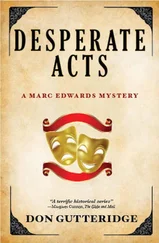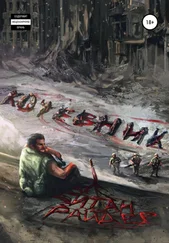Итан Рарик - Desperate Passage
Здесь есть возможность читать онлайн «Итан Рарик - Desperate Passage» весь текст электронной книги совершенно бесплатно (целиком полную версию без сокращений). В некоторых случаях можно слушать аудио, скачать через торрент в формате fb2 и присутствует краткое содержание. Жанр: Путешествия и география, на английском языке. Описание произведения, (предисловие) а так же отзывы посетителей доступны на портале библиотеки ЛибКат.
- Название:Desperate Passage
- Автор:
- Жанр:
- Год:неизвестен
- ISBN:нет данных
- Рейтинг книги:4 / 5. Голосов: 1
-
Избранное:Добавить в избранное
- Отзывы:
-
Ваша оценка:
- 80
- 1
- 2
- 3
- 4
- 5
Desperate Passage: краткое содержание, описание и аннотация
Предлагаем к чтению аннотацию, описание, краткое содержание или предисловие (зависит от того, что написал сам автор книги «Desperate Passage»). Если вы не нашли необходимую информацию о книге — напишите в комментариях, мы постараемся отыскать её.
Desperate Passage — читать онлайн бесплатно полную книгу (весь текст) целиком
Ниже представлен текст книги, разбитый по страницам. Система сохранения места последней прочитанной страницы, позволяет с удобством читать онлайн бесплатно книгу «Desperate Passage», без необходимости каждый раз заново искать на чём Вы остановились. Поставьте закладку, и сможете в любой момент перейти на страницу, на которой закончили чтение.
Интервал:
Закладка:
Such plain and apparently reliable testimony later came into question as doubts were raised about the practice of cannibalism at Alder Creek. Chiefly, these came from Eliza Donner, who turned four in the midst of the events and who later developed an iron determination to disprove allegations of cannibalism by her family. She wrote her own account of the Donner Party's ordeal, and her great triumph came during an interview with Trudeau when he recanted his earlier testimony. But this occurred decades after the entrapment, and he was telling his interviewer exactly what she yearned to hear.
The controversy cropped up again in 2005, when an archaeological team excavated the Donner families' cooking hearth and tested some of the bone fragments found there. When none of the bones proved to be human, many casual followers of the tale concluded that this finding repudiated the possibility of cannibalism. But in fact, it would have been astonishing to find archaeological evidence of cannibalism at Alder Creek. In the acidic soil of the conifer forests of the high Sierra, uncooked bone disintegrates quickly. The only bones found by the archaeologists—the only ones still there to find—were cooked. But the likelihood is small that the families at Alder Creek would have cooked any human bones. In typical cases of survival cannibalism, the desperate sufferers slice flesh from the cadavers and cook only this gruesome "meat." Not until after the supply of flesh is exhausted are the bones boiled, so they too can be eaten.
But at Alder Creek, cannibalism would have occurred for no more than a week. There were four full-grown adult bodies at hand (al-though it's possible that one or two had been lost in the deep snow), and it is unlikely that the handful of survivors would have stripped away all the flesh, requiring the cooking of bone. This is even more true if Georgia Donner's account is correct, since she suggests that the adults may not have participated. It seems unlikely that a few small children and a single teenager would have eaten all the flesh off even a single body in less than a week. So there is a high probability that when the archaeologists scrutinized their diggings for physical proof of cannibalism, they were searching for something that no longer existed. And there is an equally high probability that when James Reed and the other men of the second relief party arrived at the high camps, they saw the plain evidence all around them.
WHEN REED EVENTUALLY REACHED THE MOUNTAIN CAMPS, he walked up to the Breen cabin to find his daughter Patty sitting on the roof, her feet dangling on the snow. In the shanty he found his son Tommy, and knew that at least for now all the members of his family were alive.
"Informed the people that all who ware able Should have to Start day after tomorrow," Reed wrote in his journal. "Made soup for the infirm... and rendered evry assistance in our power."
The next morning, Reed and three of his men hiked over to the Alder Creek camps, where agonizing decisions had to be made. Betsy Donner allowed the rescuers to buy the personal property of her late husband, Jacob, whose partially cannibalized body lay nearby. No one recorded her motive, but perhaps she thought that the money would help her children, especially if she too died and left them orphaned. Boots went for $4 a pair, cordovan shoes $3, silk handkerchiefs $1.25 each. Donner's knife, the one item that wasn't some sort of garment, brought $1. A careful record was kept—subtotals for each man, the sums accurate to the penny—and in all the sale raised $118.81, presumably to be paid when the party reached California.
The harder decision for Betsy Donner must have been to divide her family yet again. Two of her children had gone out with the first relief, but five remained with her. The two smallest, Samuel and Lewis, were too weak to go, as was their mother, but she sent the three oldest, Solomon, Mary, and Isaac.
In the other Donner tent, the decision was more vexing. The three little girls were in relatively good health—"Stout harty children," Reed called them—and so was Tamzene, their mother. But George Donner, beset by the infection from his injured hand, was too weak to move. Tamzene would not leave her husband alone, and Reed told her honestly that he expected another rescue party shortly—the group led by Selim Woodworth, the naval officer whose well-supplied expedition had been moving toward the Sierra when Reed entered the wilderness. Promised that more help was on the way, Tamzene decided to stay where she was and keep her three children with her. Having done what he could, Reed bundled up Betsy Donner's children and hiked back to the lake, where his own two youngsters waited.
Since being sent back from the group that escaped with the first relief, Patty Reed had become something of a surrogate mother for her little brother Tommy, and her father seemed to recognize her new status. Before leaving for Alder Creek, he had told her that she could have flour from the rescue provisions to make bread. Patty, who had just turned nine, knew the value of the foodstuffs lugged in by the rescuers, knew that none could be wasted, knew that lives might depend on the wise use of every morsel, and yet now her father was trusting her with the precious stores. She thought herself "quite a little woman." She beamed with pride.
She also set to baking, and when the rescuers returned from Alder Creek, well after dark, the alluring smell of fresh-baked bread wafted from the Breen cabin, a stark contrast to the previous months of deprivation. The men came in—"cold and hungry and tired and heartsick," Patty recalled—and huddled around the fire for warmth. At one point, Patty promised everyone that all the bread was good—the portions she was serving to the strangers as well as those she gave to people she knew—and everyone laughed at her sweet pronouncement. "The laugh," she wrote later, "did almost as much good as the bread."
THE NEXT MORNING, REED AND THE OTHER RESCUERS led seventeen people toward the pass, once again most of them children. Elizabeth Graves took her four remaining youngsters, emptying out once and for all the big double cabin that had been built for her family and the Reeds. The Breens and their five children all left. Patrick Breen, who had so faithfully chronicled the travails of the party in his diary, ended with an astonished acknowledgment of the obdurate foe that had held them all captive. He had talked with old mountain hands among the rescue party, he noted. "They say the snow will be here untill June."
To help care for those unable to travel, Reed detailed three of his men to remain in the high camps—Clark and Cady at Alder Creek, Stone at the lake—assuring them that Woodworth would arrive soon with more help. Whatever meager provisions could be spared were left as well. Just fourteen survivors remained behind, most of them at the edge of death.
Those who walked away with Reed had endured more than four months of captivity, surviving numbing cold, debilitating disease, filth, boredom, and despair. They had divided their families in hopes that some might live while others died. They had watched their friends and family members starve, and at least some of them had been forced to cannibalize the bodies. Now their ordeal was about to get worse.
25
Terror, Terror
James Reed looked up into the sky and felt an abiding dread seize his heart. The sly was darkening, portentous clouds rolling up over the peaks. At this elevation, the clouds pressed close, looming down on a man like a monster from a nightmare.
They were three days out from the lake. Progress had been slow, and they had only surmounted the crest of the Sierra a few hours earlier. They were about as high—and about as exposed to the elements— as at any point on their journey.
Читать дальшеИнтервал:
Закладка:
Похожие книги на «Desperate Passage»
Представляем Вашему вниманию похожие книги на «Desperate Passage» списком для выбора. Мы отобрали схожую по названию и смыслу литературу в надежде предоставить читателям больше вариантов отыскать новые, интересные, ещё непрочитанные произведения.
Обсуждение, отзывы о книге «Desperate Passage» и просто собственные мнения читателей. Оставьте ваши комментарии, напишите, что Вы думаете о произведении, его смысле или главных героях. Укажите что конкретно понравилось, а что нет, и почему Вы так считаете.












